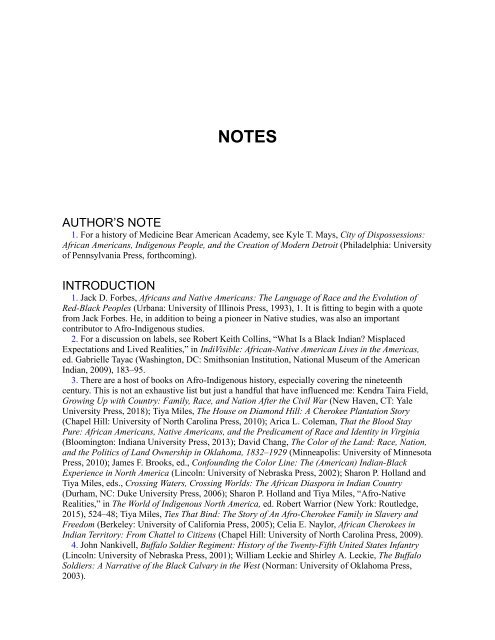You also want an ePaper? Increase the reach of your titles
YUMPU automatically turns print PDFs into web optimized ePapers that Google loves.
NOTES<br />
AUTHOR’S NOTE<br />
1. For a history <strong>of</strong> Medicine Bear American Academy, see Kyle T. Mays, City <strong>of</strong> Dispossessions:<br />
African Americans, <strong>Indigenous</strong> People, and <strong>the</strong> Creation <strong>of</strong> Modern Detroit (Philadelphia: University<br />
<strong>of</strong> Pennsylvania Press, forthcoming).<br />
INTRODUCTION<br />
1. Jack D. Forbes, Africans and Native Americans: The Language <strong>of</strong> Race and <strong>the</strong> Evolution <strong>of</strong><br />
Red-Black Peoples (Urbana: University <strong>of</strong> Illinois Press, 1993), 1. It is fitting to begin with a quote<br />
from Jack Forbes. He, in addition to being a pioneer in Native studies, was also an important<br />
contributor to <strong>Afro</strong>-<strong>Indigenous</strong> studies.<br />
2. For a discussion on labels, see Robert Keith Collins, “What Is a Black Indian? Misplaced<br />
Expectations and Lived Realities,” in IndiVisible: African-Native American Lives in <strong>the</strong> Americas,<br />
ed. Gabrielle Tayac (Washington, DC: Smithsonian Institution, National Museum <strong>of</strong> <strong>the</strong> American<br />
Indian, 2009), 183–95.<br />
3. There are a host <strong>of</strong> books on <strong>Afro</strong>-<strong>Indigenous</strong> history, especially covering <strong>the</strong> nineteenth<br />
century. This is not an exhaustive list but just a handful that have influenced me: Kendra Taira Field,<br />
Growing Up with Country: Family, Race, and Nation After <strong>the</strong> Civil War (New Haven, CT: Yale<br />
University Press, 2018); Tiya Miles, The House on Diamond Hill: A Cherokee Plantation Story<br />
(Chapel Hill: University <strong>of</strong> North Carolina Press, 2010); Arica L. Coleman, That <strong>the</strong> Blood Stay<br />
Pure: African Americans, Native Americans, and <strong>the</strong> Predicament <strong>of</strong> Race and Identity in Virginia<br />
(Bloomington: Indiana University Press, 2013); David Chang, The Color <strong>of</strong> <strong>the</strong> Land: Race, Nation,<br />
and <strong>the</strong> Politics <strong>of</strong> Land Ownership in Oklahoma, 1832–1929 (Minneapolis: University <strong>of</strong> Minnesota<br />
Press, 2010); James F. Brooks, ed., Confounding <strong>the</strong> Color Line: The (American) Indian-Black<br />
Experience in North America (Lincoln: University <strong>of</strong> Nebraska Press, 2002); Sharon P. Holland and<br />
Tiya Miles, eds., Crossing Waters, Crossing Worlds: The African Diaspora in Indian Country<br />
(Durham, NC: Duke University Press, 2006); Sharon P. Holland and Tiya Miles, “<strong>Afro</strong>-Native<br />
Realities,” in The World <strong>of</strong> <strong>Indigenous</strong> North America, ed. Robert Warrior (New York: Routledge,<br />
2015), 524–48; Tiya Miles, Ties That Bind: The Story <strong>of</strong> <strong>An</strong> <strong>Afro</strong>-Cherokee Family in Slavery and<br />
Freedom (Berkeley: University <strong>of</strong> California Press, 2005); Celia E. Naylor, African Cherokees in<br />
Indian Territory: From Chattel to Citizens (Chapel Hill: University <strong>of</strong> North Carolina Press, 2009).<br />
4. John Nankivell, Buffalo Soldier Regiment: <strong>History</strong> <strong>of</strong> <strong>the</strong> Twenty-Fifth <strong>United</strong> <strong>States</strong> Infantry<br />
(Lincoln: University <strong>of</strong> Nebraska Press, 2001); William Leckie and Shirley A. Leckie, The Buffalo<br />
Soldiers: A Narrative <strong>of</strong> <strong>the</strong> Black Calvary in <strong>the</strong> West (Norman: University <strong>of</strong> Oklahoma Press,<br />
2003).


















